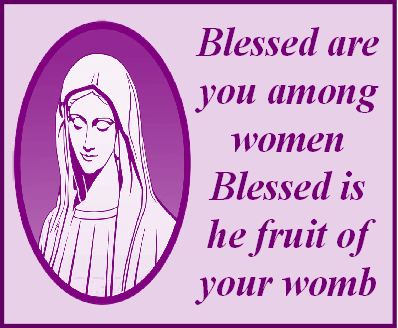19 December 2021
Micah 3:1-4a Hebrews 10:5-10 Luke 1: 34-45
Theme: Most Blessed of all women
Last Sunday it was John the Baptist, the greatest of the prophets, who was centre-stage in the liturgy. Today it is Mary, the humble maid of Nazareth. The Gospel Acclamation recalls her response of faith, trust and obedience to God’s choice of her to be mother of the Messiah: ‘I am the handmaid of the Lord: Let what you have said be done to me’ (Lk 1:38). The Gospel passage recounts the moving story of Mary’s visit to her elderly cousin, Elizabeth.
My homily will focus mainly on the significance of the gospel story, but first a word or two about our first reading from Micah, a Judaean prophet who lived in the 8th century before Christ. Micah (the name means ‘who is like God’’) gives us an attractive profile of the future Messiah, not as a warrior Lord, but as a Shepherd King like David – someone who will usher in a reign of universal peace in his person, starting from the little town of Bethlehem (‘House of Bread’): ‘He himself will be peace’ (Micah 5:4a). The peace Micah is referring to is not merely the absence of wars and conflicts, but the positive presence of wholeness, harmony, well-being, prosperity and security. No wonder then that, at Christmas time, we wish one another ‘a peaceful’ as well as a happy or joyful Christmas. At Christmas we also pray for the gift of this peace in our personal lives and in the wider world. And how we need these blessings of the Prince of Peace in our violent and divided world today!
In the gospel we have the lovely story of Mary’s visit to her cousin Elizabeth, a story rich in significance. On an obvious level, it is the story of two mothers-to-be sharing their joy at becoming the bearers of the incredible miracle of new life – a joy that ‘only a woman’s heart can know’ (Eleanor McEvoy). But the visitation story, as told by Luke, has another much deeper layer of meaning.
Mary comes to Elizabeth bearing in her womb the unborn ‘Son of the Most High’ (Lk 1:32). Elizabeth, up until then unaware of Mary’s pregnancy, nevertheless recognises her as the bearer of the hopes and desires of all nations, and life stirs within her own womb. Her unborn infant, John the Baptist, who will prepare the way for Christ moves as if to greet the baby Jesus in the womb of Mary: ‘For the moment your greeting reached my ears, the child in my womb leapt for joy’ (Lk 1:44). Elizabeth now sees Mary in a new light as ‘the Mother of my Lord’ (Lk 1:43) and addresses her in words that have become familiar to us through the ‘Hail Mary’: ‘Of all women you are the most blessed and blessed is the fruit of your womb’ (Lk 1:42). According to the former head of the Anglican Church, Archbishop Rowan Williams, Luke is here presenting Mary ‘as the first missionary, the first messenger of the gospel’. She is the first human being to bring the Good News of Jesus Christ to another person. And she does this simply by carrying him within her body.
This story, then, has much to teach us about mission and what it means to be a missionary – which, as baptised Christians, we are all called to be. Mission is not, first and foremost, about preaching or delivering a verbal message. It is rather about going out to another person with Christ in your heart. To quote again the words of Rowan Williams, ‘Mary’s mission is not about the communication of rational information from one speaker to another; it is rather a primitive current of spiritual electricity running from the unborn Christ to the unborn Baptist’. And this communication evokes a response of recognition and joy.
As the first missionary, Mary testifies to the primary importance of simply carrying Jesus with love and allowing his presence to touch those with whom we come into contact. In the Visitation scene, something happens that precedes, and prepares the way for, all the words that will be spoken, and the deeds that will come later. The example of Mary challenges us about our way of being missionaries. Have we sometimes put more trust in our resources and our expertise than in the action of God’s Spirit in our lives and in the lives of those to whom we are sent? Have we been more concerned with doing things for people than being truly present to them?
We have indeed much to learn from Mary, our Missionary Mother. She models a patient and humble mode of missionary presence, not forcing God’s hand, but bearing Jesus with ‘love beyond all telling’ (2nd Advent Preface), and allowing the space and time for his presence to evoke that leap of recognition and joy in the hearts of those we meet.
I will end with a prayer:
Mother Mary, teach us how to be a missionary after your own heart, carrying Christ with love to those to whom we are sent, and allowing his presence to evoke an awakening response of recognition and joy in their hearts. Amen.
Fr Michael McCabe SMA, December 2021
To listen to an alternative Homily from Fr Tom Casey of the SMA Media Centre, Ndola, Zambia please click on the play button below.
|
|

